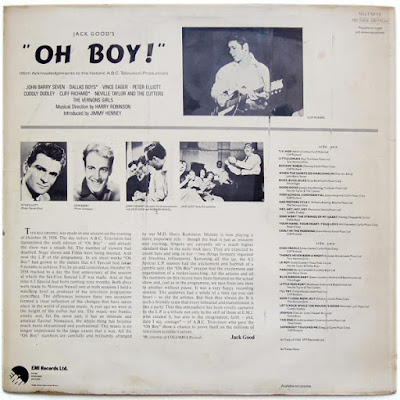"I Hear A New World" is a masterpiece. When I first heard the album, around 1989, I was living in Japan, which at the time, was indeed living in a world that seemed so familiar to me through films and books, yet a new world. Not saying that Japan is another version of outer space, but to my sensibility and aesthetic, it indeed was an out-of-space and mental landscape. Joe Meek's half-exotica (or the space-age) and Musique Concrete, with a touch of pop melodies, is a strange hybrid of science and the imagination.
Meek made this album after his odd career as an engineer for a large recording company, which mentally and aesthetically he didn't fit in. He wrote and recorded "I Hear A New World" in a London apartment (Flat) in 1960. Mostly made of tape reels and experimentation with speed, both slowing and speeding up the tape, as well as recording odd effects such as the toilet being flushed and so forth. The Blue Men were a Rhythm and Blues outfit that had strange instrumentation when they added a Hawaiian steel guitar to their mix. A weird mixture of Western and R n B and Meek had the genius even to advance that sound to another galaxy. The leader of the band, Rod Freeman, helped Meek with his compositions by transforming it into 'songs.' The Meek method was him humming the melody either in person or on a tape. The fact that Meek was tone-deaf added more work for Freeman as the music arranger. After that, it's Joe Meek 100%.
When I first heard these recordings in 1989, I thought it was music made by a madman. Re-listening to the album very recently, I conclude that it's a remarkable piece of work. Composition wise as well as how he brilliantly uses sound and shapes the aural like a magnificent sculpture in front of clay or steel. The thing with Meek, since he did work independently by choice, away from the mainstream recording industry, he truly wanted to have hits and be commercial. He succeeds it at times, but he lived the life of an outside artist, due to his homosexuality (illegal in the UK during his lifetime) and temperament, which was on the violent side. He eventually had no separation of home life and studio work, since he lived and worked in the same space. The Meek world is one of a small apartment in Northern London. The compressed sound he makes is not really of a world that is open, but in actuality very closed and almost locked up in a mixture of security concerns and paranoia. "I Hear A New World" is although about outer-space, it is more in tune with Meek's life in London at the time. Closed off from the mainstream culture, he invented a workspace where he can fully expose his demons, dreams, and sensuality.
"I Hear A New Year" if you were not aware that Meek did it, one would easily think it was a Pierre Henry piece of music in parts. Total "Musique Concrete" that is both experimental and expressing a mood of otherness. It is only when the melodies kick in that you realize it's a work by Meek, but still, the album is more avant-garde than a pop release. Especially for the year of its partly release in 1960. Meek only released vol 1 on a 7" 45 rpm disc during his lifetime.
The one album that comes to mind while listening to this Meek album is Brian Eno's "Another Green World." Both artists use the studio as a recording instrument, and both, I think could visualize another world through their sounds. Eno's album was made in 1975, and although he never credits Joe Meek, I find it difficult to believe that he wasn't aware of "I Hear A New World." Listening to both albums - side-by-side, "Another Green World" is the brother or sister (nephew or Niece) to "I Hear A New World." Eno's world is more inner, and Meek's sounds are approaching the sky above and beyond, but still, both are a very contained and cut-off world of sorts. "Another Green World," I think is Eno's best album of 'pop' songs, and Meek's album is another masterpiece of its time and place. For me, "I Hear A New World" due to the optimism of the space age, it's a painful work to look back on, considering Meek's suicide and murdering (or shooting accident) his landlady in his studio/living space.














